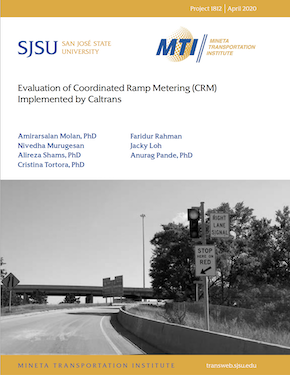- 408-924-7560
- mineta-institute@sjsu.edu
- Donate
Evaluation of Coordinated Ramp Metering (CRM) Implemented by Caltrans
Coordinated ramp metering (CRM) is a critical component of smart freeway corridors that rely on real-time traffic data from ramps and freeway mainline to improve decision-making by the motorists and Traffic Management Center (TMC) personnel. CRM uses an algorithm that considers real-time traffic volumes on freeway mainline and ramps and then adjusts the metering rates on the ramps accordingly for optimal flow along the entire corridor. Improving capacity through smart corridors is less costly and easier to deploy than freeway widening due to high costs associated with right-of-way acquisition and construction. Nevertheless, conversion to smart corridors still represents a sizable investment for public agencies. However, in the U.S. there have been limited evaluations of smart corridors in general, and CRM in particular, based on real operational data. This project examined the recent Smart Corridor implementation on Interstate 80 (I-80) in the Bay Area and State Route 99 (SR-99, SR99) in Sacramento based on travel time reliability measures, efficiency measures, and before-and-after safety evaluation using the Empirical Bayes (EB) approach. As such, this evaluation represents the most complete before-and-after evaluation of such systems. The reliability measures include buffer index, planning time, and measures from the literature that account for both the skew and width of the travel time distribution. For efficiency, the study estimates the ratio of vehicle miles traveled vs. vehicle hour traveled. The research contextualizes before-and-after comparisons for efficiency and reliability measures through similar measures from another corridor (i.e., the control corridor of I-280 in District 4 and I-5 in District 3) from the same region, which did not have CRM implemented. The results show there has been animprovement in freeway operation based on efficiency data. Post-CRM implementation, travel time reliability measures do not show a similar improvement. The report also provides a counterfactual estimate of expected crashes in the post-implementation period, which can be compared with the actual number of crashes in the “after” period to evaluate effectiveness.
AMIR M. MOLAN, PhD
Dr. Amir M. Molan, PhD, PE, is a Lecturer at California Polytechnic State University (Cal Poly). He obtained his Bachelor of Science and Master of Science degrees from Azad University in Tehran, Iran, and his doctoral degree from Wayne State University (WSU) in 2017. His research has led to new design proposals for improving the performance and extending the serviceability of existing transportation infrastructures, including interchanges and intersections.
NIVEDHA MURUGESAN
Nivedha Murugesan is working towards her Master of Science degree in Statistics at San Jose State University (SJSU). She hopes to pursue a career in data analytics after completing her studies.
ALIREZA SHAMS, PhD
Dr. Alireza Shams, PhD, is a lecturer at California Polytechnic State University (Cal Poly). He obtained his PhD in Civil Engineering-Transportation from Clemson University in 2018. His research interests include Application of new sensing technologies in Transportation such as Light Detection and Ranging (LiDAR), Transportation Safety, Asset Management, and Geographic Information System (GIS).
CRISTINA TORTORA, PhD
Dr. Cristina Tortora, PhD, is an Assistant professor in the Department of Mathematics and Statistics at San José State University. She completed her PhD in Statistics at the University of Naples Federico II in 2012. Her research focuses on data analysis, specifically, on the development of advanced clustering techniques addressing cluster flexibility, missing data, robustness in the presence of outliers, and high dimensional data sets. She collaborates with experts in applied fields, including transportation and industrial engineering.
FARIDUR RAHMAN
Faridur Rahman is a transportation engineer at GHD. He obtained his Bachelor of Science and Master of Science degrees from California Polytechnic State University (Cal Poly) in 2019. His research includes analyzing travel time relatability as a performance measures in determining impacts of project in post implementation, travel time reliability as performance measures in alternative selection, travel time reliability as a performance measure in determining impacts of wine tourism in local roadways and local systemic safety implementation.
JACKY LOH
Jacky Loh is a traffic designer at RailPros. He obtained his Bachelor of Science and Master of Science degrees from California Polytechnic State University, San Luis Obispo (Cal Poly SLO) in 2019.
ANURAG PANDE, PhD
Anurag Pande, PhD, is Professor of Civil Engineering at California Polytechnic State University, San Luis Obispo. He also serves as the Faculty Liaison for Service-Learning and as such manages Cal Poly’s outreach efforts to local and regional government and non-profit agencies.
-
Contact Us
San José State University One Washington Square, San Jose, CA 95192 Phone: 408-924-7560 Email: mineta-institute@sjsu.edu






